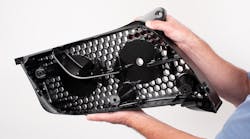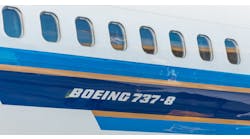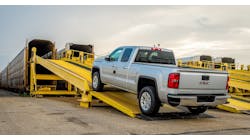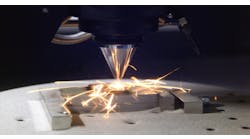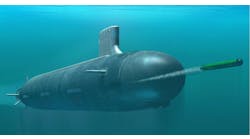Additive manufacturing specialist 3D Systems has developed a production-grade acrylate resin for use with its stereolithography (SLA) technology it reports is the first material to produce large-scale AM parts with “exceptional resolution, accuracy, and surface quality” able to withstand long-term mechanical use. The material, called Accura® AMX™ Rigid Black, will be available for producing large, structural and load-bearing parts for automotive manufacturing, among other applications.
“Accura AMX Rigid Black allows us to deliver larger, complex SLA production parts, including full-scale manufacturing aids,” explained Toyota Gazoo Racing’s Alexander Liebold, group leader, production engineering & future technologies.
3D Systems develops production processes for additive manufacturing, as well as programming and simulations software, and it develops and supplies raw materials for those operations, including wax used to produce investment casting patterns. The group’s selective laser sintering (SLS) technology produces finished parts, and its stereolithography (SLA) is used to produce tooling for carbon-fiber forms.
Since 2019, 3D Systems and TGR have partnered to develop materials for use in automotive design and production, including 3D Systems’ Figure 4® and Figure 4 PRO-BLK 10 materials, but Accura AMX Rigid Black was developed in order to produce a CNC fixture that is larger than the build size of the Figure 4 printers.
“We recently used the material to develop 3D-printed fixtures for stabilizing larger automotive components for CNC milling … we achieved 90% time savings and 60% cost savings in comparison to the previous handwork process for a batch of 40 parts,” Liebold recalled.
He noted that, in contrast to other 3D-printed parts, the Accura AMX Rigid Black parts exhibit “very smooth sidewalls and superior isotropic strength, critical for accurate jigs and fixtures that are in constant use.”
3D Systems’ materials scientists engineered Accura AMX Rigid Black for long-lasting mechanical performance and stability. It has been tested for up to eight years of indoor and one-and-a-half years of outdoor mechanical performance – and noted that the material’s surface quality is comparable to injection-molded parts and exhibits similar stress/strain toughness performance of standard thermoplastics.
In addition, the material’s high isotropic properties allow high part repeatability and accuracy.
In addition to automotive applications, 3D Systems noted the new material will have applications in consumer goods manufacturing (e.g., replacing injection molding or soft tooling processes); service bureaus (e.g., for large, structural load-bearing functional prototypes and end-use production parts); and in contract manufacturing (e.g., load-bearing parts like levers, arms, couplings, cranks, jigs, and fixtures.)
Dr. Edwin Hortelano, 3D Systems’ senior vice president, materials engineering & development, said: “As part of our strategy to invest in and continue to add innovative products to our SLA material portfolio, the introduction of Accura AMX Rigid Black is poised to address a variety of new production applications with additive manufacturing. For example, we are seeing a larger percentage of work that service bureaus are undertaking is focused on the manufacture of end-use parts.
“Accura AMX Rigid Black, in combination with our SLA 3D printing technology, will allow service bureaus to more efficiently and cost-effectively meet their customers’ needs – helping to fuel the growth of their businesses and their customers’ innovation,” he added.
